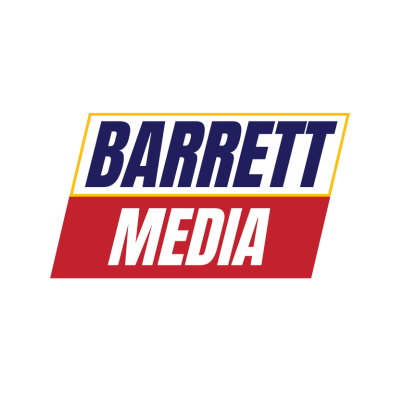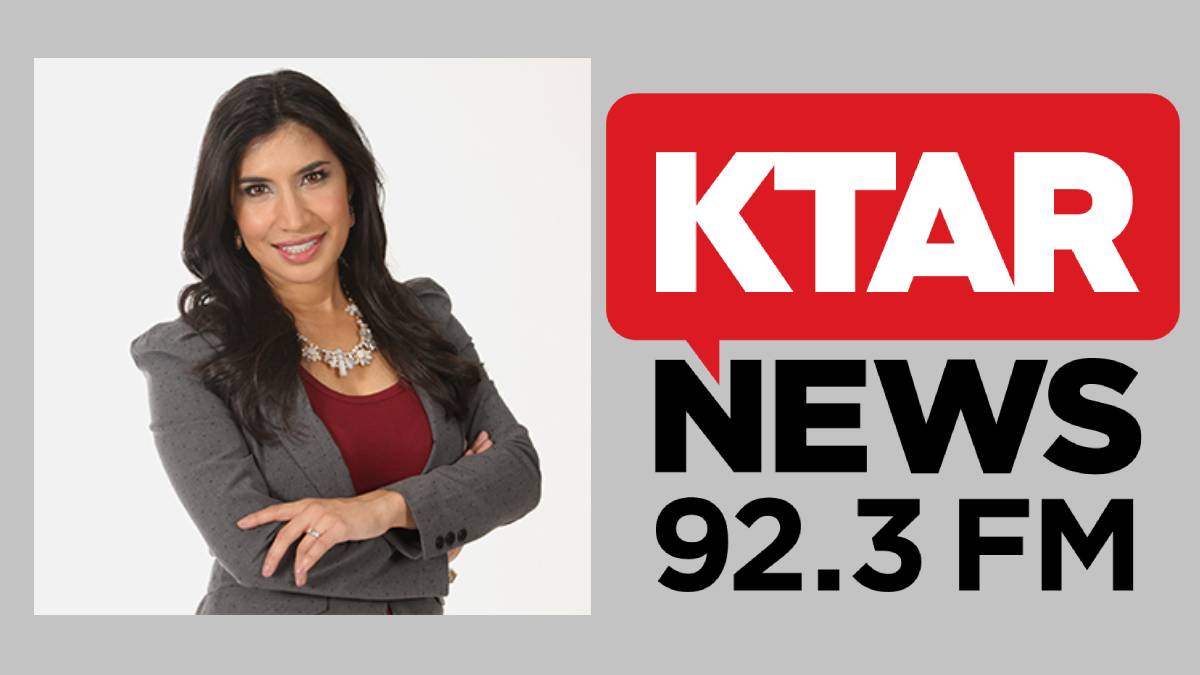New KTAR News Program Director Martha Maurer doesn’t just talk about leadership – it’s a value that was ingrained in her from a young age.
Her mother worked tirelessly, taking on multiple jobs to provide for her family. She worked as a caregiver, working with people with disabilities. Despite Maurer’s success in news and working for numerous talented and influential people, Maurer’s mother remains her source of strength. As a single parent, she showed her children the importance of hard work and commitment through her example.
Maurer’s journey at KTAR began in 2011. She had just returned from Mexico, working in PR and marketing and freelancing as a journalist. She had graduated from the prestigious Walter Cronkite School of Journalism and Mass Communication at Arizona State University years earlier but, upon returning to the U.S., realized that her skills were outdated because of the underway digital revolution.
Maurer’s career is an example of the rewards of consistent hard work. When she first joined KTAR, she had no experience in English-speaking news radio for a commercial station. However, she was determined to succeed from the beginning. When management asked her about her goals for the future, she expressed an interest in the news director position.
Although she had never considered becoming the program director, she was named the first Latina news director in KTAR’s history. Maurer is not interested in political discussions. Instead, she focuses on her community and strives to open doors for other aspiring journalists.
KTAR News is a highly respected news organization that boasts award-winning journalists. It is a top brand in the industry and is known for producing reliable work. Maurer, who was named the station’s program director earlier this month, has no plans to make major changes or disrupt the team’s work. She has confidence in their ability to maintain the high standards for which KTAR is known. In today’s climate, where misinformation is widespread, she focuses on strengthening the connections between KTAR’s past, present, and future.
In this interview, we delve into her distinctive career trajectory, the pattern of women reaching upper management positions with news/talk brands, and her thoughts on the major challenges she may face at KTAR in the future.
Ryan Hedrick: After graduating from Arizona State University, what career path did you pursue?
Martha Maurer: I went to the Walter Cronkite School of Journalism (at ASU) and graduated in 2007. While at ASU, I started my internship, leading to a job at the local Univision TV station (Spanish television). I worked production and then worked my way up to being a weekend program host of a small community show that aired at 6 AM on Saturdays, and then little-by-little would do stories for the actual evening newscast both on-air and off-air. So, that was my start in journalism from 2006 to 2008.
I moved back to Mexico for a little over three years, and while I was there, I did a little bit of freelancing in Spanish TV and radio until I came back to the U.S. in mid-2011 and I found out that I was outdated because there was this digital revolution that swept through and I couldn’t find a job in television news with someone who wanted to teach me from the ground-up. I started looking around and found an opportunity with KTAR as a news desk editor/assignment editor, and that’s how I got my start in radio.
RH: During your initial interview at KTAR, did you have any indication that the company would eventually prepare you for the role of program director?
MM: When I interviewed for the assignment desk editor position, I had never done English news radio before for a commercial station. The little bit of radio that I had done had been at ASU and then the freelancing in Mexico, but it was a private, small station, nothing like it is here [in Phoenix].
So I came not knowing anything about the radio industry or having worked in a large newsroom but what I did know, while I was away [in Mexico], is that I did appreciate working with a big team. When I was working in PR and marketing, I ended up overseeing a large team at a five-star resort.
I walked into this newsroom, knowing that I wanted to climb up the ladder. On the day of that interview for the assignment editor job, the then VP of Programming — who happens to be Ryan Hatch (now Senior VP and Market Manager of Bonneville) — walked into the office during the interview and asked me a few questions where I saw myself in 5-10 years. (Maurer made it clear that she was applying for an entry-level position, and Hatch took the time to express interest in her future goals at the station.)
I pointed to the news director chair, and I told him I would love to be in his chair; I want to grow, and I want to get to a point where I lead a newsroom. As opportunities came up and I took them, that showed that I was someone who worked hard and was willing to get to the next position.
I had never considered becoming a program director up until a few years ago. I’d be lying to you if I told you I always wanted to get to this point. I always thought that I could offer some great leadership. Leadership has always been important to me. It was shown to me by my mom, it was shown to me throughout my school, high school and at ASU, and I always tried to stay involved with leadership programs because it gave me self-love to believe if you work hard, you can get it done.
RH: It is becoming increasingly common to see women in the news/talk radio industry hold high-ranking positions and receive recognition for their achievements, including at KTAR. Can you provide some insight into this trend and how it relates to your recent successes?
MM: I’ve been the news director for KTAR for five years. At that time, when I was named news director, I was the first woman and the first Latina at the then 96-year-old station. Our station just turned 101 years old this summer. To have that accomplishment back then meant so much to me because, for that time, there hadn’t been a person of my background leading a newsroom. I take the responsibility of leading this newsroom seriously.
At the end of the day, no matter what your background is, you still have to be able to do the work. You have to show that you are the best person for the job. So, now as I step into this role as program director, I take that as a great accomplishment as well. I’m really proud; though I may not be the first woman in this role at our station (first female PD), I still am the first of Mexican-American descent, and I’m able to be in a position where I can open doors for more diverse people in our newsroom to match the makeup of Arizona which is a diverse state.
But more importantly, to provide our audience with the kind of content and diversity in the voices that they can identify with.
I’m very proud of all the women who have worked their way up in this male-dominated industry. Being from Arizona, growing up in Arizona, and going to ASU, I see diversity everywhere. That makes me feel proud of where I went to school and the work we’re doing here at KTAR.
RH: Under your leadership, how do you see the programming at KTAR evolving?
MM: That’s a tough question. Certainly, I hope to be able to bring that diversity into everything that we do. We have very talented people here at KTAR, many have been here for decades, and that’s important because at the end of the day, for this heritage station and for the people that we work for, Bonneville is a company that truly cares about its people. I want to continue to keep that in mind, to be guided by the principles of Bonneville for everybody who works for us and for our community.
We’re not just here trying to make some money; we’re trying to do better for the community. One of the things [I am trying to accomplish] is not changing our station; it’s strengthening the work that we do. Locally, here in the valley, telling the stories that really matter and impact and are important to our audience.
We can’t forget our next generation. More people will be coming into this industry, and we want to keep it alive. Radio is not just the radio industry; it’s the media industry, we have to evolve to the changing demands and needs and the way that people consume the content.
RH: Based on your experience in television, do you have any unique ideas or plans for cross-media partnerships that you would like to implement at KTAR?
MM: Locally, we already have a partnership with the ABC affiliate (ABC15) here. I hope to be able to branch that into perhaps a Spanish-speaking affiliation at some point. Again, back to diversity. Provide more opportunities for all Arizonians to consume the content in another language, with more intent to cover specific communities. (Nothing specific in in this area to share right now)
RH: As a new program director at KTAR, what do you consider to be your biggest challenge so far, just over a week into the job?
MM: We are about to go into another big election, which always comes with challenges. We want people to trust our station. Overall, trust in journalism could be higher. Our job is to maintain our ability to be the place that people can go to and trust the source.
I think [the greatest challenge] is staying true to who we are, delivering on the promise that we have to our communities, and hopefully, people will continue to listen, however that may be, whether it’s digitally, mobile device, or on video. It’s not just about the radio. It’s about being where the audience is. Finding new channels, new avenues to provide the content, and staying true to ourselves so that our audience can continue to trust the information we give them.









